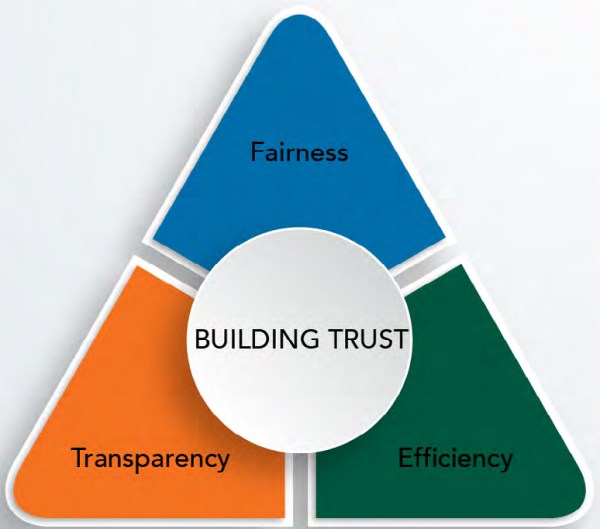A new world lies ahead, shaped by positive reform

Full speed towards a fairer, more efficient and trusted strata insurance market.
The words regulation and reform in financial services generally conjure up images of excess paperwork and persistent headaches. But it doesn’t have to be that way.
2022 presents an opportunity to embrace reform and forever change the way we do business for the benefit of both ourselves and our customers. The outcome of the Hayne Royal Commission led to several new initiatives that commenced in 2021, and with sound processes in place, we’ll see them brought to life in 2022.
Breach Reporting (RG 78) – expands the situations that are reportable to ASIC and outlines specific timelines for reporting.
Internal Dispute Resolution (RG 271) – provides a new definition of complaint as an “expression of dissatisfaction”, written or verbal, which includes those made about companies as well as those made to companies, while also introducing a tighter timeline for responses.
PDDO (RG 274) – requires an insurer to produce a Target Market Determination for its products to act in the best interests of clients.
Anti-Hawking (RG 38) – prohibits offering a product for sale through an unsolicited meeting or telephone call unless personal advice is provided.
ICA – Duty of Disclosure – the insured no longer has a duty to disclose but must “take reasonable care not to make a misrepresentation”, effectively moving the responsibility to the insurer to ask for the risk information they need.
Taking a stand on community expectations
Back in February 2021, Steadfast announced its Nine Positions as a commitment to ensuring it’s meeting and exceeding the expectations of its customers and the broader community.
As part of the Steadfast Group, BCB adheres to the Nine Positions, which set a benchmark for behaviour and business practice across the Steadfast network.
Getting a handle on breach reporting
We’ve stayed ahead of the curve and here are some changes we’ve introduced in relation to RG 78.
• Creating a transparent “no blame” reporting culture so all issues/incidents are reported when they happen.
• Employing a dedicated Compliance and Governance Manager to monitor and oversee business risks.
• Implementing a comprehensive training and communications program to educate all employees on the importance of good complaint management and appropriate breach procedures.
Case studies considered by the Financial Services Royal Commission found that licensees failed to report breaches within the time required due to:
• failure to report and escalate an issue internally
• inadequate internal records
• inadequate systems.
BCB’s National Compliance and Governance Manager, James Morton, explains further.
“To comply with the breach reporting obligations in RG 78, a business needs a policy that outlines sound systems, processes and procedures. Its purpose is to ensure you fully comply with the breach reporting obligations, have capacity and speed when identifying and investigating incidents, demonstrate a solid breach management culture that makes reporting and customer remediation a priority, and helps you turn breaches into opportunities to learn and improve.”
Raising red flags
When developing and applying a “no blame” culture, it can help to put yourself in the eyes of the regulator and consider how they might view your business.
If you find yourself reporting several breaches, this may not immediately be an indicator of poor performance. Instead, it shows you have adequate processes in place to identify issues. Whereas if you don’t report any breaches, this may raise a red flag with ASIC, suggesting issues are being swept under the rug rather than being identified and managed.
Our commitment to excellent service and quality products
To help us continually improve our standards, BCB uses complaints to identify areas where our service may have fallen short of customer expectations.
In pursuit of the fair, transparent and timely resolution of disputes, we encourage customers to:
• let us know if we have provided advice that they believe is incorrect or unsatisfactory
• tell us if we haven’t responded to an enquiry within a reasonable time frame
• make us aware of any situation where they’re unhappy with how our service was delivered
• call out where the conduct of employees or BCB via social media or other published information has been discriminatory, rude, or offensive.
Clear and transparent communication is critical when managing complaints and forms part of RG 271. For example, BCB can’t respond directly to complaints about decisions made by insurers, such as claim outcomes, but we do have an obligation to ensure the complaint is referred to the appropriate firm for a response. It’s not good enough to ignore it just because we can’t action the response ourselves.
Stronger and all together or not at all
When you start to view reform as a positive change, it becomes less of a burden. It’s effectively taking steps to deliver superior customer service and a more positive customer experience, which is a goal we’re ultimately all striving to achieve.
With all of us working together within our strata ecosystem, we can use reform to help us better protect the lives and livelihoods of our strata communities, helping them make well informed insurance decisions.
We are United, Protecting Communities.


View Comments
(0)